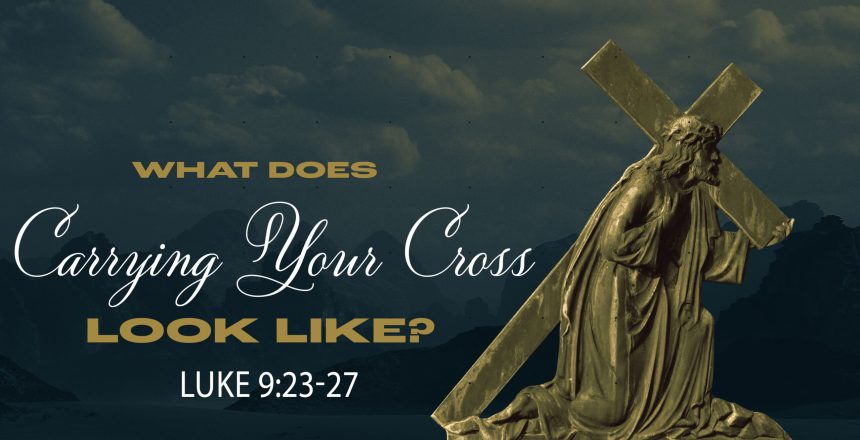When Jesus spoke about carrying our cross in Luke 9:23-27, He wasn’t telling us to bear the weight of our sins—He already did that for us. Instead, He was calling us to a deeper, more committed walk with Him. Not just claiming to know Christ, but showing it through our daily lives.
What Does “Take Up Your Cross Daily” Really Mean?
Jesus uses the word “daily” intentionally. This means carrying our cross isn’t automatic just because we’re Christians. It’s a conscious decision we must make every morning when we wake up. And it’s not just a one-time decision during the day—it means all day, every day, 24/7.
This requires a complete mindset and lifestyle change. We often limit “carrying our cross” to difficult circumstances or tough situations. But Jesus calls us to carry our cross whether life is good or bad, whether we feel great or terrible.
What Does Carrying Your Cross Look Like?
1. Sacrificing Your Fleshly Desires
Jesus asks in Luke 9:25, “What does it profit a man if he gains the whole world and loses or forfeits himself?” We could spend our entire lives pursuing worldly desires that ultimately mean nothing when we die.
Paul explains this beautifully in Ephesians 4:20-24, telling us to “put off your old self” and “put on the new self created after the likeness of God.” When we’re born again in Christ, we’re no longer bound by our old ways or our flesh. We’ve been set free from the sins that once held us.
In Galatians 5:16-17, Paul makes another important point: “The desires of the flesh are against the Spirit, and the desires of the Spirit are against the flesh.” These opposing forces exist to keep us from simply doing whatever we want. God calls us to obedience by denying our natural desires and embracing what He wants for us.
2. Sacrificing Your Shame and Pride
Luke 9:26 warns that “whoever is ashamed of me and of my words, of him will the Son of Man be ashamed.” Jesus Himself is our perfect example of putting aside shame and pride.
Philippians 2:5-7 describes how Jesus, “though he was in the form of God, did not count equality with God a thing to be grasped, but emptied himself by taking the form of a servant.” Jesus came to earth fully man and fully God, stepping down from His heavenly position to live among us.
The Jews expected a savior who would free them from Roman rule. Instead, Jesus came to save them from their sins. They rejected Him so completely that they had Him crucified—one of the most brutal and humiliating deaths imaginable. Yet Jesus put away any shame He might have felt because He knew His Father’s will and mission.
When we put away our shame and pride and focus on God’s mission for us, we can accomplish what He’s called us to do. Shame and pride only get in the way of what God wants to work through us.
3. Sacrificing for the Sake of Christ
In Luke 9:24, Jesus says, “Whoever would save his life will lose it, but whoever loses his life for my sake will save it.” He’s not necessarily saying we all must become martyrs, but He is asking: if God put you in a situation where death was the outcome for Christ’s sake, would you remain obedient and committed?
Jesus exemplified this by being “obedient to the point of death, even death on a cross” (Philippians 2:8). He’s asking if we would stay faithful even if suffering or death were the result of serving Him.
The apostle Paul is another powerful example. In 2 Corinthians 11:23-28, he lists his sufferings for Christ: imprisonments, countless beatings, being near death multiple times, receiving 39 lashes five times, being beaten with rods three times, being stoned, shipwrecked three times, and facing constant dangers, hardships, and anxieties.
Paul often knew what he was walking into. In Acts, the Holy Spirit told him he would be imprisoned, yet he still faithfully carried his cross and entered that city to spread the gospel. What fueled Paul was knowing the power of Jesus—that He died and was resurrected, and that this message was mankind’s greatest hope.
Life Application
Jesus isn’t asking us to carry our cross alone. He’s saying, “Because I carried my cross, you carry yours—and I’ll be with you.” He walks with us because He experienced everything we might face.
Here are some practical ways to apply this teaching:
Make carrying your cross part of your daily prayer. Ask Jesus for strength and courage to remain committed and obedient to Him no matter what you face.
Examine your life: Are there fleshly desires you need to deny? Are shame and pride preventing you from fully embracing Christ?
Consider what sacrifices you might need to make for Christ. Are you willing to face discomfort, rejection, or even persecution for His sake?
Remember that carrying your cross isn’t just about enduring hardship—it’s about choosing obedience to Christ in every circumstance, good or bad.
Ask yourself: Am I truly carrying my cross daily? Am I denying what my flesh wants to do? Have I pushed away shame and pride so I can mention Jesus’ name without embarrassment? Would I remain obedient to God no matter what stands before me—even persecution or suffering?
The call to carry your cross is a call to the utmost commitment and obedience. But it’s also a call to experience the deepest relationship with Christ, who promises to walk beside you every step of the way.




